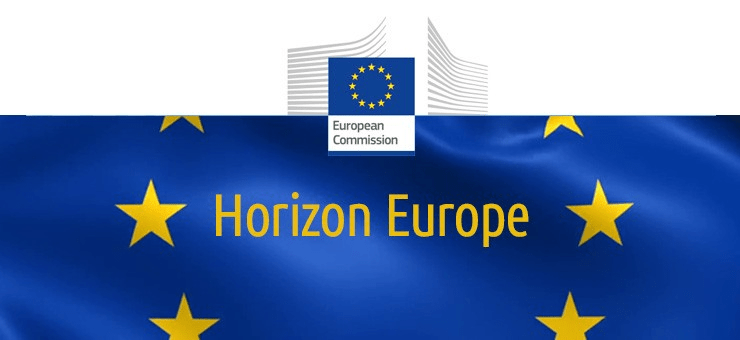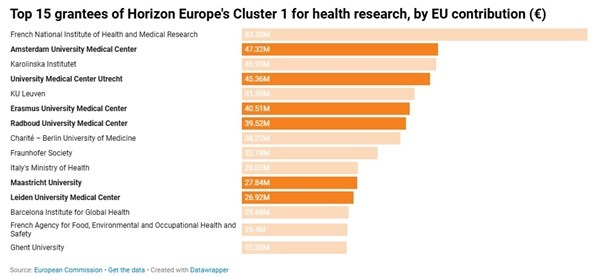Dutch medical universities are leading the way in Horizon Europe-funded health research, with six of them making it to the top 15 grantee list. UMC Utrecht secured the 4th spot with an accumulation of grants exceeding €45 million since 2021. Together, these Dutch universities have participated in projects 250 times and attracted €227 million in funding from Horizon Europe’s cluster focused on health research and innovation. That’s out of €4.7 billion that the EU has invested in collaborative health research in this period.
Dutch organisations overall do much better in health research than in other areas of collaborative research. While the country is the second biggest beneficiary in the ‘health’ cluster, thus far receiving €522 million, it is only sixth in collaborative Horizon research overall. Among the six universities, the leaders are the Amsterdam UMC (#2) and UMC Utrecht (#4), each securing more than €45 million in funding. The other Dutch UMCs in the Top 15 are Erasmus MC, Radboudumc, Maastricht UMC and LUMC (see Table below).
Merel-Marlijn Sondervan, Head of the Funding & Support team (part of the Research Office) said: ”Over the past five years UMC Utrecht has further professionalized the in-house grant advice. It all starts with understanding our needs followed by an effective lobby to get suitable calls in the Work Programs. The Funding & Support team stands out in one particular service: in-house grant writing. Depending on the funding program, researchers can benefit from this expertise. In some programs (like the EU Health Program) the internal success rate is stabilized above 60 percent, double the average Dutch success rate. It’s not only about landing the funds, with the guidance of experienced project managers the projects we get awarded can be delivered successfully. On top of that, the team offers extensive advice on national, European and international grants.”
The university medical centers likely owe part of their success to the Netherlands’ top-tier hospital and innovation infrastructure as well as strong collaborative networks bringing together universities, hospitals and research institutions. But it does not mean they have it easy. Last year, the universities called on the European Commission to simplify Horizon rules, suggesting that the EU research programme has become unmanageable even for the best equipped.
Prof. Elly Hol, PhD, Vice-dean of Research commented: “We see that with the complex regulations it is important to have in-house expertise and experience. A reliable partner to help avoid risks and solve issues. More importantly, to help deliver these research and innovation projects impactful. We can be proud of the in-house services and the infrastructure we have. The combination of impactful research and innovation ideas with the needed expertise is a golden one. With the upcoming transformation of our governance model we foresee to utilize this unique combination even more.”
“We can be proud of the in-house services and the infrastructure we have. The combination of impactful research and innovation ideas with the needed expertise is a golden one.”
Despite their success, the Dutch universities still have a lot of catching up to do with the cluster’s biggest beneficiary. The multi-center French National Institute of Health and Medical Research (INSERM) has won €83 million in funding across 84 projects, including 23 in coordinator role. Other leaders include Sweden’s Karolinska Institutet, with €47 million, and Belgium’s KU Leuven, with €41.5 million. On paper, however the health research cluster’s biggest beneficiary is the Coalition for Epidemic Preparedness Innovations, but this financing is a direct grant to the foundation rather than funding won through a competitive call for proposals. For this reason, it is omitted from the table.
Source: Science Business, July 8, 2025

